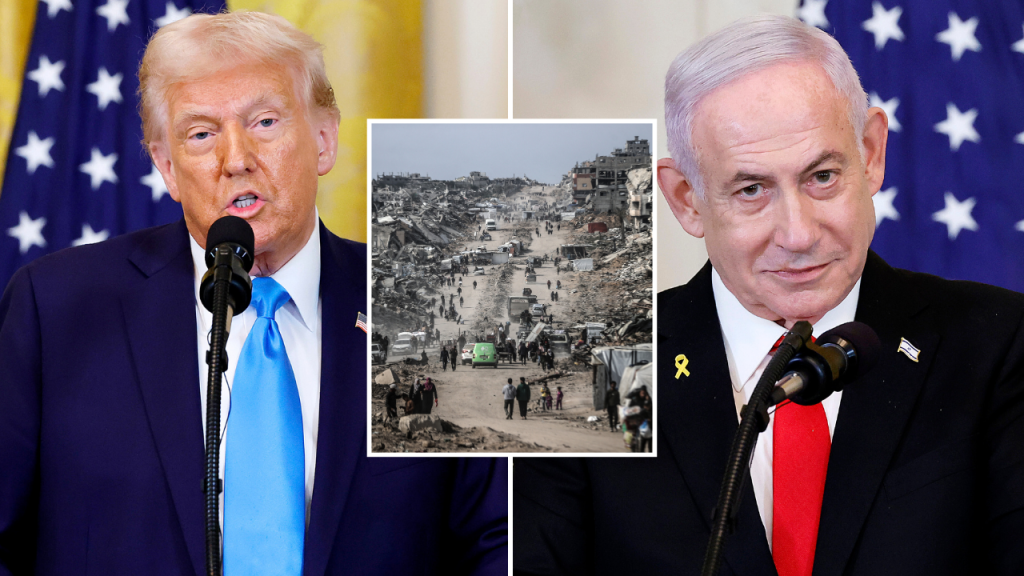In a significant shift in tone, President Donald Trump has urged Israeli Prime Minister Benjamin Netanyahu to take a humanitarian approach towards Gaza, emphasizing the suffering of its residents. During a recent conversation aboard Air Force One, Trump highlighted the urgent need for food and medical assistance in the region, a stark contrast to his previous, more aggressive rhetoric. This plea comes amidst ongoing tensions and hostilities, as the Israeli military continues its operations in Gaza, raising questions about the future of humanitarian aid and hostage negotiations.
| Article Subheadings |
|---|
| 1) Humanitarian Concerns Raised |
| 2) The Shift in Trump’s Strategy |
| 3) Continuing Crisis in Gaza |
| 4) International Response and Reactions |
| 5) The Future of Aid and Hostage Situations |
Humanitarian Concerns Raised
President Donald Trump has expressed a pressing need to address the humanitarian crisis in Gaza during his recent discussions with Israeli leaders. He underscored the significant suffering experienced by civilians in the region, stating, “You’ve got to be good to Gaza” as he urged for more assistance to be provided. With reports indicating shortages of essential supplies such as food and medicine, Trump’s statements reflect a heightened awareness of the urgent humanitarian needs in the area. His comments come after numerous reports highlighted the plight of Gazans facing dire living conditions exacerbated by ongoing military operations.
The Shift in Trump’s Strategy
Historically, Trump’s stance on Gaza has been characterized by a more aggressive tone. In previous statements, he warned of heavy repercussions for Hamas should they fail to release hostages. However, this latest approach signals a notable shift towards diplomacy and humanitarian considerations. During a recent meeting at the White House with Netanyahu, Trump suggested that the U.S. could play a pivotal role in stabilizing the region. This change in rhetoric may be part of a broader strategy to enhance U.S. influence in the Middle East while also addressing international demand for humanitarian relief. Trump’s balancing act aims to satisfy both his base, which may seek a strong stance against terrorism, and the growing call for humanitarian support.
Continuing Crisis in Gaza
The situation in Gaza remains critical, with a humanitarian crisis deepening due to ongoing military actions. Since March 2, no aid trucks have entered Gaza, leading to international uproar over the deteriorating conditions faced by its inhabitants. While Trump is reportedly encouraging Netanyahu to adopt a more humanitarian perspective, Israeli officials remain firm in their stance that aid will not be permitted until the remaining hostages are released. There is widespread concern within Israel regarding allegations of aid being diverted to Hamas militants rather than reaching those in need. This creates a complex backdrop to the ongoing negotiations for humanitarian assistance.
International Response and Reactions
The international community has been closely monitoring the situation in Gaza, with various humanitarian organizations expressing outrage over the lack of aid. The United Nations has called for immediate action to alleviate human suffering, indicating that reports of aid being withheld until hostages are released have led to growing frustrations. Freed hostages, such as Eli Sharabi, have voiced their tales of captivity, calling attention to how supplies marked with U.N. branding were available to their captors. The U.N. Security Council is expected to convene discussions focusing on these humanitarian concerns, pressuring Israel and the U.S. to find a balanced resolution.
The Future of Aid and Hostage Situations
As negotiations continue, the path forward regarding both humanitarian aid and the hostage crisis remains unclear. The Israeli agency responsible for coordinating activities in the territories, known as COGAT, reported that when a previous hostage deal was in place, substantial amounts of humanitarian aid had successfully entered Gaza. However, with rising tensions and public scrutiny, the Israeli government is cautious about allowing aid that could potentially support Hamas. The question persists: how can the U.S. and Israel navigate this complex landscape to ensure that aid reaches those in need without compromising national security interests? The intertwined nature of these issues leaves both humanitarian needs and hostage negotiations hanging in a delicate balance.
| No. | Key Points |
|---|---|
| 1 | Trump urges humanitarian support for Gaza amidst ongoing Israeli military operations. |
| 2 | His remarks indicate a notable shift from previous aggressive postures towards diplomacy. |
| 3 | The crisis in Gaza has worsened with a lack of aid flowing into the region. |
| 4 | International organizations urge for immediate humanitarian action. |
| 5 | The future of hostage negotiations and aid remains uncertain, with rising tensions complicating efforts. |
Summary
The current situation in Gaza encapsulates a complex nexus of humanitarian need and security concerns, necessitating a nuanced approach from both U.S. and Israeli leaders. With President Trump’s recent call for increased humanitarian aid to Gaza amidst ongoing military operations, the administration faces a critical moment to redefine its foreign policy strategy in the region. Balancing the urgent needs of the Gazan population with security priorities remains a challenging task. As tensions continue to rise, the international community watches closely, advocating for urgent responses to alleviate human suffering.
Frequently Asked Questions
Question: What are the main humanitarian concerns in Gaza?
The primary humanitarian concerns in Gaza include severe shortages of food, medicine, and other essential supplies due to ongoing military operations and the effective blockade preventing aid from reaching those in need.
Question: How has Trump’s stance changed regarding Gaza?
Trump’s approach has shifted from a predominantly aggressive posture to one that emphasizes humanitarian support, reflecting a growing awareness of the conditions facing Gazans amid the conflict.
Question: What international actions are being taken in response to the crisis in Gaza?
International organizations, particularly the United Nations, are calling for immediate humanitarian action to address the crisis, urging both the U.S. and Israel to facilitate the flow of aid to Gaza while managing security concerns.



